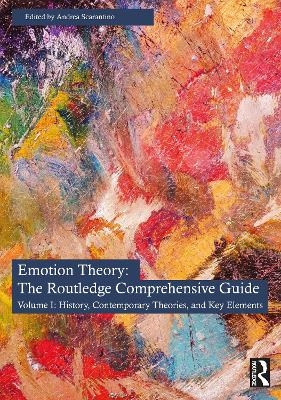
Emotion Theory: The Routledge Comprehensive Guide
Routledge (Verlag)
978-1-138-67668-8 (ISBN)
Emotion Theory: The Routledge Comprehensive Guide is the first interdisciplinary reference resource which authoritatively takes stock of the progress made both in the philosophy of emotions and in affective science from Ancient Greece to today. A two-volume landmark publication, it provides an overview of emotion theory unrivaled in terms of its comprehensiveness, accessibility and systematicity.
Comprising 62 chapters by 101 leading emotion theorists in philosophy, classics, psychology, biology, psychiatry, neuroscience and sociology, the collection is organized as follows:
Volume I:
Part I: History of Emotion Theory (10 chapters)
Part II: Contemporary Theories of Emotions (10 chapters)
Part III: The Elements of Emotion Theory (7 chapters)
Volume II:
Part IV: Nature and Functions of 35 Specific Emotions (22 chapters)
Part V: Challenges Facing Emotion Theory (13 chapters)
Special Elicitors of Emotions
Emotions and Their Relations to Other Elements of Mental Architecture
Emotions in Children, Animals and Groups
Normative Aspects of Emotions
Most of the major themes of contemporary emotion theory are covered in their historical, philosophical, and scientific dimensions. This collection will be essential reading for students and researchers in philosophy, psychology, neuroscience, sociology, anthropology, political science, and history for decades to come.
Andrea Scarantino is Professor of Philosophy at Georgia State University, where he has taught since 2005. He has published more than 40 papers on emotions, information, computation, and communication.
Introduction to Volume I: History, Theoretical Options, Challenges
Andrea Scarantino
Part I: History of Emotion Theory
1. Emotion Theory in Ancient Greece and Rome
Pia Campeggiani and David Konstan
2. Emotion Theory in Ancient and Classical India, from 500 BCE to 1200 CE
Maria Heim
3. Emotion Theory in Early and Medieval China, from 500 BCE to 1200 CE
Curie Virág
4. Emotion Theory in the Middle Ages
Simo Knuuttila
5. Emotion Theory in the Renaissance
Sabrina Ebbersmeyer6. Emotion Theory in the 17th Century
Lisa Shapiro
7. Emotion Theory in the 18th Century
Eric Wilson
8. Emotion Theory in the 19th Century at the Rise of Scientific Psychology
Rainer Reisenzein
9. Emotion Theory in the 19th and 20th Century Phenomenological Tradition
Ingrid Vendrell-Ferran
10. Emotion Theory in the First Half of the 20th Century
Anna Kennedy and Keith Oatley
Part II: Contemporary Theories of Emotions
11. An Overview of Contemporary Theories of Emotions in Philosophy
Michael Brady
12. An Overview of Contemporary Theories of Emotions in Psychology
Agnes Moors
13. An Overview of Contemporary Theories of Emotions in Neuroscience
Stephan Hamann
14. An Overview of Contemporary Theories of Emotions in Sociology
Kathryn Lively
15. Basic and Discrete Emotion Theories
Michelle Shiota
16. Appraisal Theories of Emotions
Phoebe Ellsworth
17. Constructionist Theories of Emotion in Psychology and Neuroscience
Lisa Barrett and Tsiona Lida
18. Social Constructionist Theories of Emotions
Batja Mesquita and Brian Parkinson
19. Cognitivist Theories of Emotions in Philosophy and Affective Science
Bennett Helm
20. Motivational Theories of Emotions in Philosophy and Affective Science
Andrea Scarantino
Part III: The Elements of Emotion Theory
21. Are Emotions Events, Processes, Mechanisms or Dispositions?
Hichem Naar
22. Is Emotion Physiology More Compatible with Discrete, Dimensional or Appraisal Accounts?
Bruce Friedman and Julian Thayer
23. Can Brain Data Be Used to Arbitrate Between Emotion Theories?
Philip Kragel, David Sander, Kevin LaBar
24. What Do Nonverbal Expressions Tell Us About Emotion?
Disa Sauter and Jim Russell
25. Which Emotional Behaviors are Actions?
Jean Moritz Müller and Hong Yu Wong
26. Emotional Experience: What Is It and What Is It For?
Richard Dub
27. How Should We Understand Valence, Arousal and Their Relation?
Giovanna Colombetti and Peter Kuppens
| Erscheinungsdatum | 03.01.2020 |
|---|---|
| Reihe/Serie | Routledge Handbooks in Philosophy |
| Zusatzinfo | 3 Tables, black and white; 23 Illustrations, black and white |
| Verlagsort | London |
| Sprache | englisch |
| Maße | 178 x 254 mm |
| Gewicht | 1380 g |
| Themenwelt | Geisteswissenschaften ► Philosophie |
| Geisteswissenschaften ► Psychologie ► Allgemeine Psychologie | |
| Geisteswissenschaften ► Psychologie ► Psychoanalyse / Tiefenpsychologie | |
| Geisteswissenschaften ► Psychologie ► Verhaltenstherapie | |
| Medizin / Pharmazie ► Medizinische Fachgebiete ► Psychiatrie / Psychotherapie | |
| ISBN-10 | 1-138-67668-3 / 1138676683 |
| ISBN-13 | 978-1-138-67668-8 / 9781138676688 |
| Zustand | Neuware |
| Informationen gemäß Produktsicherheitsverordnung (GPSR) | |
| Haben Sie eine Frage zum Produkt? |
aus dem Bereich


